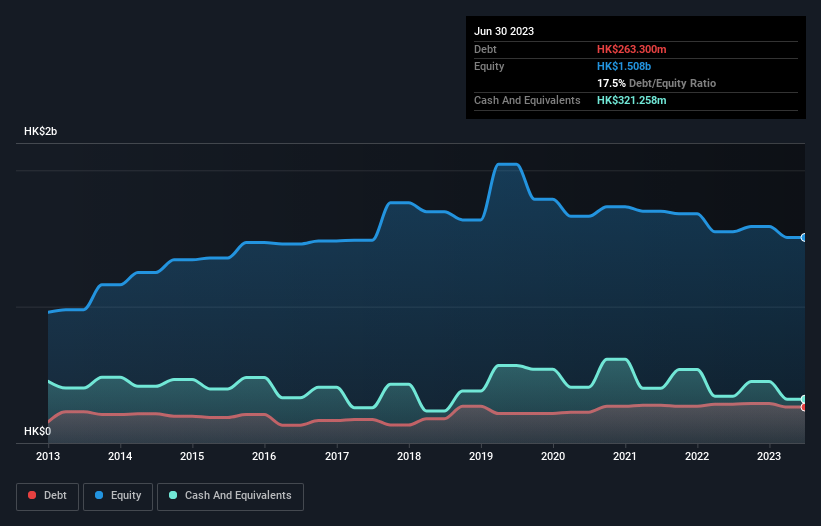David Iben put it well when he said, 'Volatility is not a risk we care about. What we care about is avoiding the permanent loss of capital.' So it seems the smart money knows that debt - which is usually involved in bankruptcies - is a very important factor, when you assess how risky a company is. As with many other companies CNT Group Limited (HKG:701) makes use of debt. But the more important question is: how much risk is that debt creating?
Why Does Debt Bring Risk?
Generally speaking, debt only becomes a real problem when a company can't easily pay it off, either by raising capital or with its own cash flow. Ultimately, if the company can't fulfill its legal obligations to repay debt, shareholders could walk away with nothing. While that is not too common, we often do see indebted companies permanently diluting shareholders because lenders force them to raise capital at a distressed price. Of course, plenty of companies use debt to fund growth, without any negative consequences. The first thing to do when considering how much debt a business uses is to look at its cash and debt together.
See our latest analysis for CNT Group
What Is CNT Group's Net Debt?
The image below, which you can click on for greater detail, shows that CNT Group had debt of HK$263.3m at the end of June 2023, a reduction from HK$285.0m over a year. However, it does have HK$321.3m in cash offsetting this, leading to net cash of HK$58.0m.

How Strong Is CNT Group's Balance Sheet?
The latest balance sheet data shows that CNT Group had liabilities of HK$555.6m due within a year, and liabilities of HK$64.8m falling due after that. On the other hand, it had cash of HK$321.3m and HK$298.5m worth of receivables due within a year. So these liquid assets roughly match the total liabilities.
This state of affairs indicates that CNT Group's balance sheet looks quite solid, as its total liabilities are just about equal to its liquid assets. So while it's hard to imagine that the HK$590.1m company is struggling for cash, we still think it's worth monitoring its balance sheet. While it does have liabilities worth noting, CNT Group also has more cash than debt, so we're pretty confident it can manage its debt safely. When analysing debt levels, the balance sheet is the obvious place to start. But you can't view debt in total isolation; since CNT Group will need earnings to service that debt. So if you're keen to discover more about its earnings, it might be worth checking out this graph of its long term earnings trend.
In the last year CNT Group had a loss before interest and tax, and actually shrunk its revenue by 23%, to HK$600m. That makes us nervous, to say the least.
So How Risky Is CNT Group?
While CNT Group lost money on an earnings before interest and tax (EBIT) level, it actually generated positive free cash flow HK$73m. So taking that on face value, and considering the net cash situation, we don't think that the stock is too risky in the near term. Until we see some positive EBIT, we're a bit cautious of the stock, not least because of the rather modest revenue growth. There's no doubt that we learn most about debt from the balance sheet. But ultimately, every company can contain risks that exist outside of the balance sheet. Be aware that CNT Group is showing 3 warning signs in our investment analysis , and 1 of those makes us a bit uncomfortable...
If, after all that, you're more interested in a fast growing company with a rock-solid balance sheet, then check out our list of net cash growth stocks without delay.
New: AI Stock Screener & Alerts
Our new AI Stock Screener scans the market every day to uncover opportunities.
• Dividend Powerhouses (3%+ Yield)
• Undervalued Small Caps with Insider Buying
• High growth Tech and AI Companies
Or build your own from over 50 metrics.
Have feedback on this article? Concerned about the content? Get in touch with us directly. Alternatively, email editorial-team (at) simplywallst.com.
This article by Simply Wall St is general in nature. We provide commentary based on historical data and analyst forecasts only using an unbiased methodology and our articles are not intended to be financial advice. It does not constitute a recommendation to buy or sell any stock, and does not take account of your objectives, or your financial situation. We aim to bring you long-term focused analysis driven by fundamental data. Note that our analysis may not factor in the latest price-sensitive company announcements or qualitative material. Simply Wall St has no position in any stocks mentioned.
About SEHK:701
CNT Group
An investment holding company, manufactures and sells paint and coating products in Hong Kong and Mainland China.
Adequate balance sheet with minimal risk.
Market Insights
Community Narratives




